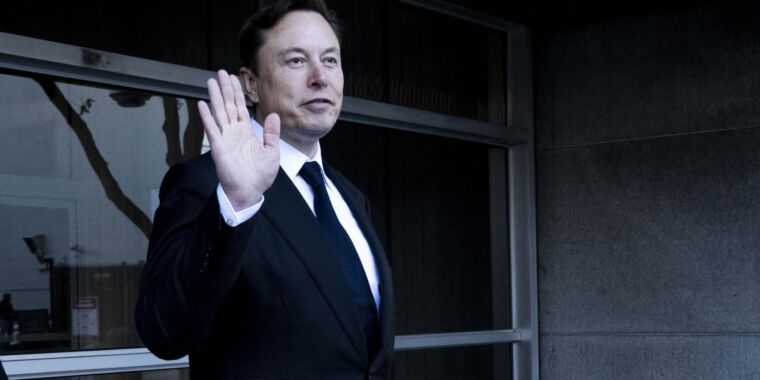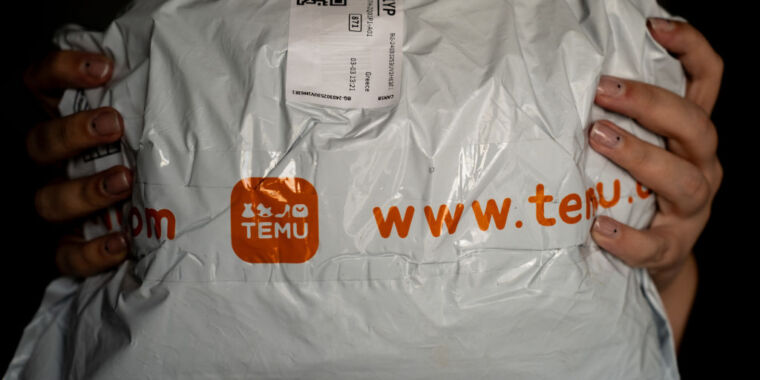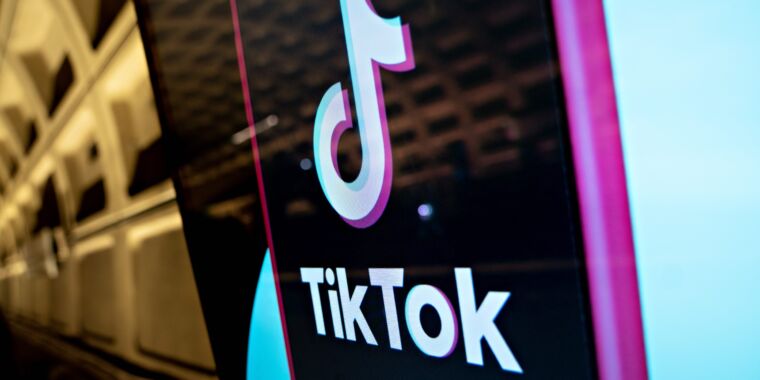Getty Images | Bloomberg
A federal court ordered Elon Musk to comply with a subpoena issued by the Securities and Exchange Commission, rejecting Musk’s claims that the SEC is “harassing” him and exceeding its authority to investigate.
In an order issued Saturday, US Magistrate Judge Laurel Beeler wrote that “the SEC has broad authority to issue subpoenas.” The information it seeks from Musk is relevant to the agency’s investigation into “possible violations of the federal securities laws in connection with the respondent’s 2022 purchases of Twitter stock and his 2022 statements and SEC filings relating to Twitter,” Beeler wrote.
Musk testified twice in July 2022, but the SEC said it has obtained thousands of new documents since then and wants him to testify a third time. Beeler’s order granted the SEC’s application to enforce the subpoena and ordered the SEC and Musk to “confer within one week and settle on a date and location for the testimony. If they cannot agree, then they may submit a joint letter brief with their respective positions, and the court will decide the dispute for them.”
Beeler, a magistrate judge at US District Court for the Northern District of California, had indicated she would rule against Musk during a hearing in mid-December. During the hearing, Beeler said she would issue an order compelling Musk to testify if the sides didn’t promptly agree on a date and time for a deposition.
Only “minimal relevance” needed to enforce subpoena
The SEC began its investigation in April 2022 after Musk acquired a 9 percent stake in Twitter and failed to disclose it within 10 days as required under US law. The investigation expanded beyond the late disclosure and “relates to all of Musk’s purchases of Twitter stock in 2022 and his 2022 statements and SEC filings,” the SEC previously told the court.
The SEC sued Musk in October over his refusal to testify again. Musk claimed in a court filing that the SEC probe is motivated by Musk’s political beliefs and “reeks of McCarthyism.”
“This is an investigative subpoena. Minimal relevance is required to enforce it,” Beeler wrote. The SEC “has satisfied all administrate prerequisites” for the subpoena and it “can compel the attendance of witnesses that it deems relevant or material to its investigation.”
The SEC issued formal orders authorizing SEC staff to investigate, Beeler noted. “Because the SEC issued its subpoena lawfully, the burden shifts to the respondent to prove that the subpoena was issued in bad faith or for an improper purpose, such as harassment or to pressure that person to settle a collateral dispute or is ‘overbroad or unduly burdensome,'” Beeler wrote.
Musk did not meet that burden, the order said. “He did not object to the subpoenas initially and asked only for an accommodation for his schedule. Only later did he object to the testimony as irrelevant and harassing, in part because he testified twice previously,” Beeler wrote.
While Musk claims the SEC is harassing him, Beeler wrote that his “claims of harassment generally are challenges to the relevancy of the SEC’s continued investigation. But the SEC’s subpoena is within its authority” and “seeks relevant information.”
Musk argument on SEC authority rejected
Beeler then addressed Musk’s claim that the subpoena violates the US Constitution’s Appointments Clause because “only a properly appointed officer who is subject to appropriate presidential supervision may exercise authority of the type entrusted to the SEC Enforcement staff in this case.”
Musk is hoping that the SEC’s powers will be limited by the Supreme Court in the pending SEC v. George Jarkesy case, which relates to whether the SEC can impose fines in administrative proceedings. Musk asked the District Court to either reject the subpoena outright or stay the proceedings against him until the Supreme Court issues a ruling in Jarkesy. Beeler decided that a stay wasn’t necessary.
The SEC says that its “staff attorneys who sign subpoenas are non-officer employees not subject to the Appointments Clause” because they lack the powers of a federal judge. “Instead, the attorneys are performing investigative functions pursuant to the SEC’s formal orders,” Beeler wrote. “Moreover, as this case shows, the SEC cannot compel compliance with its subpoenas: it needs a court order.” In sum, Beeler rejected Musk’s call for a stay because the pending Jarkesy case “is unlikely to affect the outcome here.”
The Musk-led SpaceX has made similar arguments about the authority of other agencies. In September 2023, SpaceX sued US Attorney General Merrick Garland and two other Department of Justice officials in response to the government’s allegations that SpaceX discriminated against asylees and refugees in hiring. SpaceX claimed that the DOJ’s administrative process for handling the discrimination complaint is unconstitutional because the administrative law judge adjudicating the government’s complaint “is unconstitutionally insulated from Presidential authority.”
Last month, SpaceX sued the National Labor Relations Board in response to the agency’s allegation that SpaceX illegally fired eight employees who drafted and distributed an open letter that criticized Musk. SpaceX’s lawsuit claimed the US labor agency’s structure is unconstitutional because the administrative law judge cannot be removed by the president of the United States.




